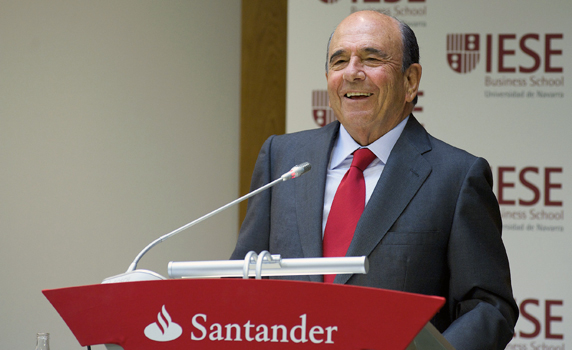It is safe to say that Emilio Botín was an extraordinary person in every way. Without a doubt, the history of banking and the Spanish economy will surely bestow him a place of honor, no matter how the story is written. He had a decisive influence in shaping the history of the society in which he lived. In his remembrance, biographers will inevitably refer to “Botín and his era.”
It is common knowledge that Emilio Botín succeeded his father (also a prominent banker) at the helm of a financial institution (Banco Santander) that had been healthy and well known for years, but ranked just sixth among Spanish banks in terms of deposits, assets, capitalization, and number of branches and employees, far behind the key players of the Spanish financial system. Thanks to his leadership, by the time of his passing the bank had not only risen to the top of the Spanish banking industry, it had also opened up at the global level, now ranking second in Europe (behind only HSBC) and tenth worldwide in terms of market capitalization.

With Emilio Botín as chairman, Banco Santander was able to penetrate deep into the competitive markets of Britain, Brazil and the U.S., and gain significant presence in many others.
However, these accomplishments are merely indicators of business excellence, which reflect the personality of Botín, but certainly do not paint the whole picture. His legacy, in the historical context of the Spanish banking sector, goes far beyond the parameters of successful executive leadership, as important as that may have been.
Botín not only managed to energize the bank he presided over and take it to unimaginable new heights, he also created, promoted and led the way in a radical transformation of Spain’s entire banking system toward modernization amid the country’s political and social transition. In fact, shortly after taking over as president of Banco Santander, in the mid 1980s, he made the bold decision to break up the banking oligopoly of the “big seven,” which until then were unwavering stalwarts in the Spanish financial system. He did it by starting an open war on investor returns and the framework of bank deposits, which were previously subject to competitive restrictions, imposed not only by laws, but also by the implicit agreement of the large banks.
Thus began a race to conquer new market shares, which did not require the consent of the group’s other members. Competitors had no choice but to follow him, albeit reluctantly and with contempt for his disloyalty towards the status quo. After that arduous market battle brought on by Botín, the Spanish banking sector would never be the same again.
Winner of the legitimate contest, Botín stuck to his bold competitive strategy and, through a series of moves, ended up taking over the ownership and management of major competitors such as Banesto, Banco Central and Banco Hispano Americano — much of the crème de la crème of Spain’s banking system — which, thanks to the efforts of Botín, underwent a radical modernizing transformation.
This piece is only a quick homage to an extraordinary figure in the Spanish banking landscape. But it would be an injustice not to at least highlight some of Emilio Botín’s other key contributions to the society of his era — which is also ours. These include his strong support of Brand Spain at all international levels, and of Spain’s Competitiveness Council, the organization for promoting the country’s economic modernization; his patronage of figures from the sports world; and, above all, his commitment to strive for excellence in the world of education and culture, through the Universia program, now present in many Latin American countries, an effort that will benefit and be appreciated by future generations.
 Juan José Toribio is Emeritus Professor of Economics. He received a B.Sc. in economics from the Universitat de Barcelona. He also received an ITP from the Harvard Business School, as well as an M.A. and Ph.D. in economics from the University of Chicago.
Juan José Toribio is Emeritus Professor of Economics. He received a B.Sc. in economics from the Universitat de Barcelona. He also received an ITP from the Harvard Business School, as well as an M.A. and Ph.D. in economics from the University of Chicago.
Professor Toribio has led a long, successful career in the public and private sectors, as well as in academia. He started his career as economist for the Banco de España (Spanish Central Bank). Following this, he became a senior official, first in the Spanish Government as the general manager of financial policy in the Spanish Ministry of Finance and, later on, as executive director of the International Monetary Fund (IMF).


Botín was certainly a revolutionary figure.